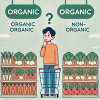How Technology is Revolutionizing Organic Vegetable Farming
Organic vegetable farming has evolved significantly from conventional, manual methods to a more productive, technology-based method. Organic farming is now being revolutionized by advances in agriculture technology (AgTech), making it more sustainable, productive, and profitable.
From AI-based monitoring systems to precision agriculture methods, the latest innovations are assisting farmers in cultivating healthier, pesticide-free vegetables with a reduced environmental footprint. But in what ways is technology transforming organic vegetable cultivation? Let’s take a look at the newest trends and innovations.

1. IoT & AI-Based Smart Farming
One of the largest technology advances in organic cultivation is the application of Internet of Things (IoT) sensors and Artificial Intelligence (AI).
How it Works:
- IoT sensors track soil moisture, temperature, and nutrient content in real-time.
- AI-based analytics enable farmers to make informed decisions for increased crop yields.
- Automated irrigation systems regulate water consumption according to real-time soil conditions.

Why It Matters:
With such intelligent systems, farmers can maximize water usage, save water, and improve soil health, which is essential for preserving organic standards. AI also assists in the early detection of plant diseases and pests, minimizing the use of chemical interventions.
2. Drones & Satellite Imaging for Precision Agriculture

Disclaimer: This graph is for informational purposes only. For official data, please refer to sources such as the Pakistan Bureau of Statistics (PBS) and FAO.
Those days are long gone when farmers used to solely depend on manual checks. Drones and satellite imaging now offer aerial views regarding crop health, soil status, and potential vulnerabilities.
How it Works:
- Drones equipped with multispectral cameras scan plant wellness and identify initial signs of stress.
- Satellite imaging provides big-picture monitoring to monitor crop development patterns over time.
- AI-based systems read data to give actionable suggestions for healthier crops.

Why It Matters:
These technologies enable organic farmers to detect issues before they become alarming, giving them healthier vegetable yields without synthetic fertilizers or pesticides.
3. Organic Vegetable Farming with Robotics & Automation
Farm robots are revolutionizing organic vegetable farming by lowering labor expenses and enhancing efficiency.
How it Works:
- Robotic weeders employ AI and computer vision to detect weeds and eliminate them without damaging crops.
- Precision harvesting with automated harvesters reduces crop damage and wastage.
- Tractors drive autonomously to conduct tillage, seeding, and fertilization independently.

Disclaimer: This graph is for informational purposes only. For official data, please refer to sources such as the Pakistan Bureau of Statistics (PBS) and FAO.
Why It Matters:
Through automating lengthy procedures, organic farmers can spend their time concentrating on quality and sustainability, assuring that products attain organic certification requirements.
4. Vertical Farming & Hydroponics for Urban Organic Vegetables

With urban farming on the rise, vertical farming and hydroponics are turning out to be game-changers for organic vegetable production in urban areas.
How it Works:
- Vertical farms stack crops in controlled indoor environments, using LED lighting and climate control for year-round production.
- Hydroponic systems grow vegetables without soil, using nutrient-rich water solutions instead.
- AI-powered climate control systems adjust humidity, temperature, and CO₂ levels to maximize growth.
Why It Matters:
- Reduces land use while increasing yield.
- 90% less water than conventional farming.
- No use of synthetic fertilizers and pesticides.
This technology provides fresh organic vegetables in cities with low transportation emissions, following the principles of sustainable agriculture.
5. Blockchain for Organic Certification & Transparency
As demand for organic vegetables is on the rise, consumers are seeking guarantees that their vegetables are organic. Blockchain technology is making supply chains transparent.
How it Works:
- Farmers document their organic farming methods on a blockchain ledger.
- Each production step, from planting to harvesting to distribution, is monitored and authenticated.
- Customers can scan a QR code on packaging to trace the entire farm-to-table process.

Disclaimer: This graph is for informational purposes only. For official data, please refer to sources such as the Pakistan Bureau of Statistics (PBS) and FAO.
Why It Matters:
Blockchain technology establishes trust by offering authentication proof for organic certification, protecting farmers and consumers from counterfeit organic labeling.
6. Biotech Innovations in Organic Fertilization

Modern organic farming is, instead of using synthetic fertilizers, embracing biotech-based natural fertilizers to enhance soil fertility.
How it Works:
- Beneficial bacteria in microbial fertilizers increase soil fertility.
- Biochar technology improves the structure of soil and holds onto nutrients.
- AI assists in the analysis of the composition of soil to identify optimal organic amendments.
Why It Matters:
These sustainable innovations facilitate soil regeneration, which is essential to ensure the long-term sustainability of organic vegetable cultivation.
7. Solar-Powered and Renewable Energy Farming
Organic agriculture is getting green in multiple ways. Numerous farms are increasingly using solar, wind, and biogas power to drive their operations.
How it Works:
- Greenhouses and irrigation pumps are powered by solar panels.
- Wind turbines provide electricity for farm machinery.
- Farm waste is processed into renewable energy by biogas systems.

Why It Matters:
A shift to renewable energy reduces carbon footprints, making organic agriculture even more eco-friendly and economical.
Final Thoughts: The Future of Organic Farming is Tech-Driven
The synergy of AI, IoT, robotics, vertical farming, blockchain, and renewable energy is defining the future of organic vegetable farming. These revolutionary innovations enable farmers to produce healthier crops, boost productivity, and reduce environmental footprint.
As technology keeps advancing, we can anticipate even more sustainable, efficient, and transparent farming practices that benefit both farmers and consumers.












Add comment